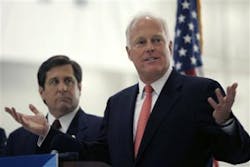Carriers Approve Teterboro, N.J. Airport Curfew
Teterboro Airport's major operators have agreed to a nighttime curfew and a ban on the noisiest jets at the busy airport, a deal public officials hailed as relief for residents weary of aircraft noise and safety concerns.
The restrictions, to be announced today by Rep. Steve Rothman, D-Fair Lawn, are voluntary and cover about 50 percent of the operators that fly from Teterboro.
Rothman and Anthony R. Coscia, chairman of the Port Authority of New York and New Jersey, expect 90 percent of operators to comply with the new rules by the end of next year.
"We have demonstrated that even if operators at the airport initially disagreed or the FAA tried to put obstacles in our way, we could achieve significant victories with regard to a reduction in aircraft noise and improvements in safety," Rothman said Tuesday.
Officials said a voluntary agreement is necessary because the Federal Aviation Administration has opposed attempts by the Port Authority, which owns Teterboro, to restrict flights at the airport, which is surrounded by residential neighborhoods and businesses on Route 46. The FAA requires general aviation airports that receive federal grant money to be open to any pilot who wants to land there.
Coscia said the voluntary restrictions "do not represent a solution" to the persistent problem of congested airspace and rising demand for private aviation. But he called the agreement a step in the right direction.
"We consider it very much to be a work in progress given the FAA's unwillingness to [permit] restrictions that we would otherwise like to impose," Coscia said.
James K. Coyne, who represented the aviation industry in talks with Rothman, said the groups agreed to restrictions because they thought changes were coming sooner or later to an airport he called "the most important general aviation airport in the world."
"I hope we can get the same kind of industrywide cooperation at every airport, but the players were all there at Teterboro," said Coyne, president of the National Air Transportation Association.
In recent years, as residents protested increasing flights and accidents, the Port Authority sought to check Teterboro's growth by raising landing fees and opposing scheduled charter service. Teterboro handled 193,427 takeoffs and landings in 2005, and officials said the number is down about 7 percent this year.
Carol Skiba, a Hasbrouck Heights councilwoman, said she doubts the new restrictions will provide much comfort for residents.
"Flights need to be cut," Skiba said. "Seeing is going to be believing, but I really doubt there is going to be any change."
Rothman said residents, who can comment and make suggestions at a public meeting at Teterboro on Nov. 9, will be impressed by the rules.
"I expect that within six months they [residents] will notice the operations at Teterboro are quieter, safer and occur much less often during 11 p.m. [to] 6 a.m.," he said, adding that legislation to curb flights is possible if the voluntary restrictions fail.
Owners of stage-2 jets, generally 40 percent to 50 percent louder than newer aircraft, would likely land at Newark Liberty International Airport instead, Coyne said. These aircraft have typically made up about 5 percent of Teterboro's operations, Port Authority officials said.
The Port Authority did not release the number of flights arriving at Teterboro at night.
Nathan McKelvey, president of a company that handles reservations for charter flights, said international flights are most likely to arrive overnight. Teterboro now handles about 10,000 international operations a year.
McKelvey, president of Jets International, said the new rule amounts to a sacrifice by Teterboro's fixed-base operators, which sell fuel to charter companies and other business jets.
"The big fuel sales are to big airplanes coming in from long-haul trips," he said.
RESTRICTIONS: The new rules include:
-- A pledge to avoid takeoffs and landings between 11 p.m. and 6 a.m.
-- The exclusion of stage 2 aircraft, noisier jets that were built between the early 1960s and 1980s.
-- The development of a safety management system that would require pilots to familiarize themselves with the airport's runways, overrun areas and wind patterns.
-- An agreement to work with the federal Transportation Security Administration to develop best practices for security and screening of passengers.
Copyright 2005 LexisNexis, a division of Reed Elsevier Inc. All rights reserved.
Terms and Conditions | Privacy Policy
News stories provided by third parties are not edited by "Site Publication" staff. For suggestions and comments, please click the Contact link at the bottom of this page.

